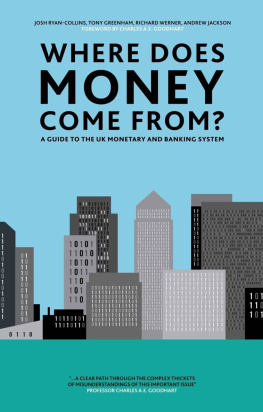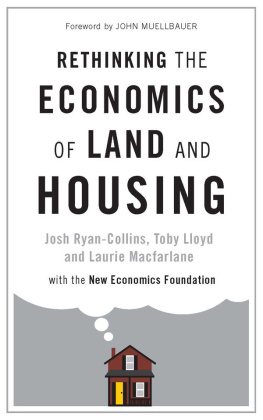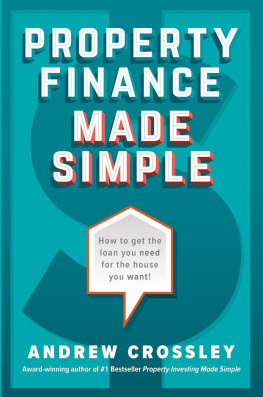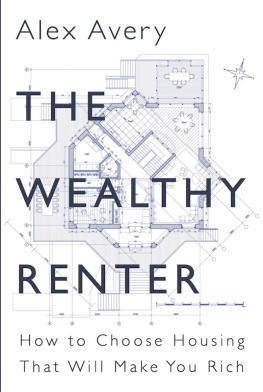Contents
List of Figures
- Figure 1.1: House price-to-income ratio indexed to long-term average in 15 advanced economies since 1981
- Figure 1.2: Home ownership in Anglo-Saxon economies since 1980 (share of all households)
- Figure 2.1: US land, housing and consumer price indices, 2000 = 100
- Figure 2.2: Home ownership rates for Anglo-Saxon countries (share of all households)
- Figure 2.3: Decline in local property taxes in the US, 19521995 (% total)
- Figure 3.1: Mortgage credit and house prices across advanced economies since 1870
- Figure 3.2: Mortgage credit and non-mortgage credit (commercial and domestic) outstanding in advanced economies, 19502013
- Figure 3.3: Two circuits of bank credit
- Figure 3.4: US credit allocation by sector and real house prices, 19472013
- Figure 3.5: Bank credit allocation by sector and real house prices in the UK, 19632015
- Figure 3.6: Domestic mortgage debt-to-GDP ratios in European countries and the US in 1998 and 2009
- Figure 3.7: The housingfinance feedback cycle
- Figure 3.8: Real house prices, selected Eurozone countries, 19802016
- Figure 4.1: US home equity withdrawal, 19902017
- Figure 4.2: Ratio of total household mortgage debt to value of housing stock, 1980 and 2013
- Figure 4.3: Non-financial assets as percentage of GDP in the UK, 19952017
- Figure 5.1: House price-to-income ratios in Germany, Japan, Korea and Anglo-Saxon economies indexed to long-term average (100), 19952016
- Figure 5.2: Bank credit allocation in Germany and real house prices, 19682013 (credit stocks to GDP)
Guide
Pages

The Future of Capitalism series
Steve Keen, Can We Avoid Another Financial Crisis?
Ann Lee, Will Chinas Economy Collapse?
Malcolm Sawyer, Can the Euro be Saved?
Danny Dorling, Do We NeedEconomic Inequality?
Chuck Collins, Is Inequality in America Irreversible?
Peter Dietsch, Franois Claveau, and Clment Fontan, Do Central Banks Serve the People?
Deborah Hargreaves, Are ChiefExecutives Overpaid?
Josh Ryan-Collins, Why Cant You Afford a Home?
Why Cant You Afford a Home?
Josh Ryan-Collins
polity
Copyright Josh Ryan-Collins 2019
The right of Josh Ryan-Collins to be identified as Author of this Work has been asserted in accordance with the UK Copyright, Designs and Patents Act 1988.
First published in 2019 by Polity Press
Polity Press
65 Bridge Street
Cambridge CB2 1UR, UK
Polity Press
101 Station Landing
Suite 300
Medford, MA 02155, USA
All rights reserved. Except for the quotation of short passages for the purpose of criticism and review, no part of this publication may be reproduced, stored in a retrieval system or transmitted, in any form or by any means, electronic, mechanical, photocopying, recording or otherwise, without the prior permission of the publisher.
ISBN-13: 978-1-5095-2329-0
A catalogue record for this book is available from the British Library.
Library of Congress Cataloging-in-Publication Data
Names: Ryan-Collins, Josh, author.
Title: Why cant you afford a home? / Josh Ryan-Collins.
Other titles: Why cannot you afford a home?
Description: Medford, MA : Polity, 2018. | Series: The future of capitalism | Includes bibliographical references and index.
Identifiers: LCCN 2018019591 (print) | LCCN 2018020874 (ebook) | ISBN 9781509523290 (Epub) | ISBN 9781509523252 (hardback) | ISBN 9781509523269 (paperback)
Subjects: LCSH: Housing--Prices. | Housing--Finance. | Mortgage banks. | Banks and banking. | BISAC: POLITICAL SCIENCE / Public Policy / Economic Policy.
Classification: LCC HD7287 (ebook) | LCC HD7287 .R93 2018 (print) | DDC 333.33/8--dc23
LC record available at https://lccn.loc.gov/2018019591
The publisher has used its best endeavours to ensure that the URLs for external websites referred to in this book are correct and active at the time of going to press. However, the publisher has no responsibility for the websites and can make no guarantee that a site will remain live or that the content is or will remain appropriate.
Every effort has been made to trace all copyright holders, but if any have been overlooked the publisher will be pleased to include any necessary credits in any subsequent reprint or edition.
For further information on Polity, visit our website: politybooks.com
About the author
Josh Ryan-Collins is Head of Research at the Institute of Innovation and Public Purpose, University College London, a new research and policy centre focused on how the public sector can shape and create markets to deliver public value. He was previously Senior Economist at the New Economics Foundation (NEF), one of the UKs leading think tanks, where he worked for ten years and led a program of research focused on the role of money and land in the economy.
Josh has written two previous co-authored books: Where Does Money Come From? (2011, NEF), now used as a textbook in many universities; and Rethinking the Economics of Housing and Land (2017, Zed Books), which was included in the Financial Times top 12 economics books of 2017. He holds a PhD in economics and finance from the University of Southampton Business School and has published in academic journals including Nature: Climate Change and the British Journal of Sociology.
He lives in Brixton, South London with his partner and daughter.
Acknowledgements
The central idea for this book of a feedback cycle between finance and house prices was first published in the form of a blog Fixing the Doom Loop I wrote in 2016 as part of a series of seminars on Rethinking Public Assets, co-organized by Oxford University Department of Politics and International Relations, the New Economics Foundation and Positive Money. The concept was further developed in the UK context in of the book Rethinking the Economics of Land published by Zed books and co-authored with Toby Lloyd and Laurie Macfarlane.
I owe an intellectual debt to a number of experts on banking, housing, economic rent and land and the links between them with whom I have engaged over the past seven years. These include Richard Werner, Dirk Bezemer, Michael Hudson, John Muellbauer, Claudio Borio, Tony Greenham, Michael Kumhof, Adair Turner, Alice Martin, Duncan McCann, Beth Stratford, Andrew Purves, Mariana Mazzucato and Steve Keen. George Owers at Polity Press and two anonymous reviewers provided valuable comments on early drafts of the book.
I would also like to thank scar Jord, Moritz Schularick, Alan M. Taylor, Katharina Knoll and Thomas Steger whose path-breaking and publicly available long-run macroeconomic history dataset has been a key resource in tracing the historical relationship between house prices and bank credit and which I used for a number of the graphics in the book. The dataset is available online at: http://www.macrohistory.net/data/.
The arguments in Why Cant You Afford a Home? have benefitted from being presented at a number of seminars and lectures at the New Economics Foundation and the Institute for Innovation and Public Purpose, based in the Bartlett Faculty of the Built Environment at University College London.
And a final but large thank you to my partner Salome and our daughter Elsa, for their support and patience during the writing period.
Introduction
A remarkable transformation is occurring in advanced capitalist economies. Home ownership and housing more generally is becoming unaffordable for large swathes of citizens. In nearly all advanced economies since the early 2000s, the ratio of house prices to incomes has increased significantly above its long-term average (). The financial crisis of 20089 led to a fall in the ratio, but it has rebounded sharply since 2013.














